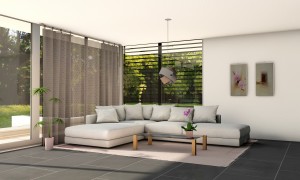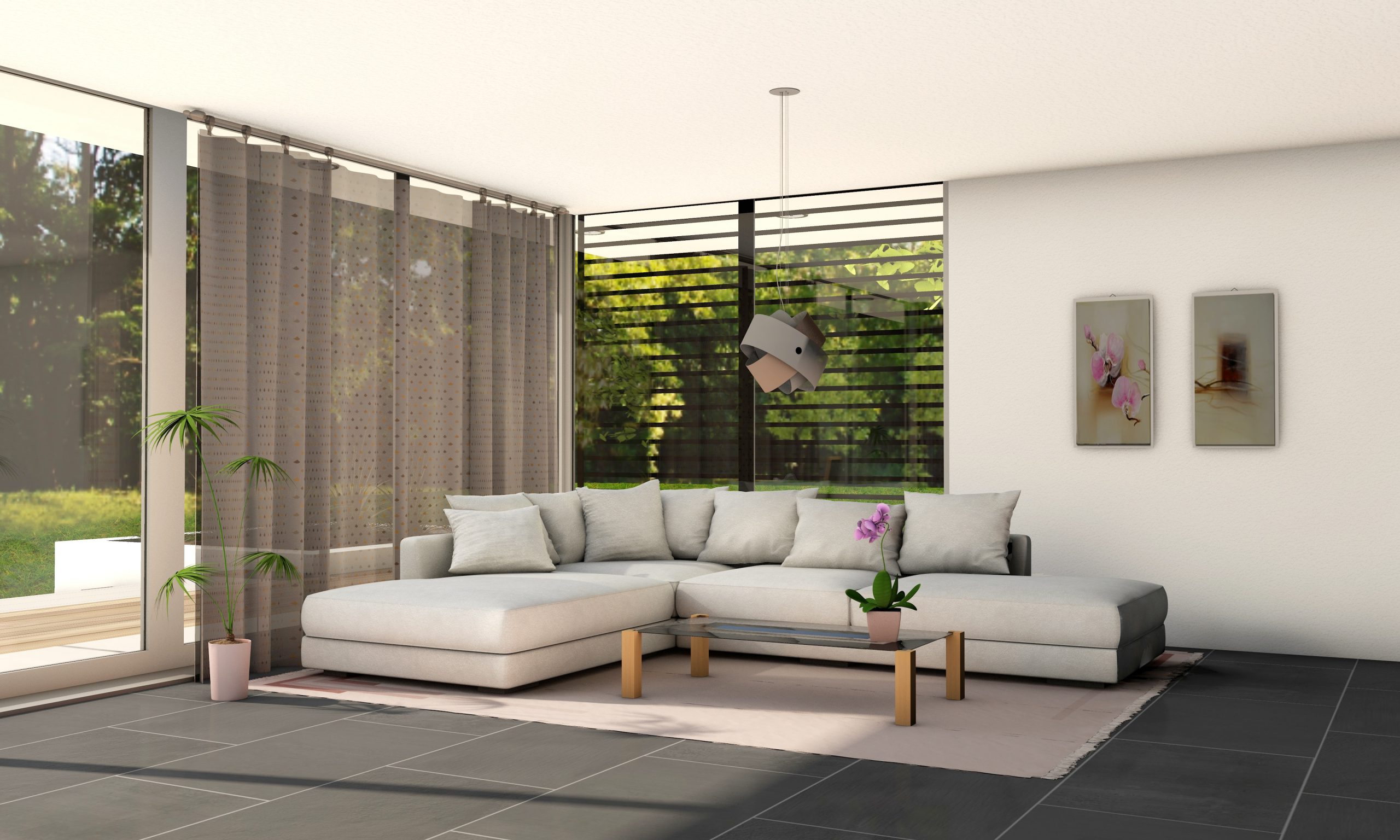Window film not only makes rooms that are filled with natural sunlight more comfortable, but also protects your furniture and you from harmful UV rays that you might be underestimating.
When outdoors in the summertime, most people are aware of the dangers of sun exposure and do what they can to protect themselves. On cloudy days, however— and even more so when we’re indoors— we tend to think we are safe from UV radiation, but this is a dangerous misconception. As it turns out, even in the comfort of our own homes we are not safe from the harmful effects of the sun.
Ultraviolet rays can penetrate clouds and glass. This means that when you’re standing at the kitchen sink, looking through the window at your yard, no matter what the weather is like, you’re at risk for UV damage.
UVA and UVB Rays
Your windows will block UVB rays on their own. These are the intense sun rays that can give you a sunburn, but they’re not nearly as prevalent as UVA rays. UVA rays are present during all daylight hours year round, and can cause premature skin aging, skin cancer and serious eye damage.
If you need proof, take a look at the back side of your curtains, the back of a chair, or any furniture that faces a window and notice the fading that has occurred over the years. If your favorite place to sit is in that chair by the window, your skin and eyes could be suffering the same sun damage.
The Health Risks of Sun Exposure
Eighty-five percent of melanomas and about 90 percent ofnon-melanoma skin cancers are related to UV radiation exposure. It breaks down the Vitamin A in your skin, damaging your skin cells and collagen, which leads to the premature aging of the skin. The sun’s sneaky UVA rays can also cause debilitating eye conditions, like cataracts and macular degeneration.
Therefore, the Skin Cancer Foundation recommends that we adopt a year-round sun protection regimen, which includes seeking shade, wearing UV blocking sunglasses and a broad spectrum sunscreen every day, and having solar window film installed on your home.
Solar window film can help stop UVA rays from damaging your skin, your eyes, and your home’s interior.
The Skin Cancer Foundation has vouched for a few brands of solar window film by awarding its Seal of Recommendation. Panorama window films, among others granted with the seal, have been proven to provide users with safe and effective protection from UV radiation.
Solar Window Film’s Role in Protecting Your Health
Solar Gard’s selection of Panorama window films have the ability block 99% of harmful UVA rays. Having the strength and effectiveness of these high-performance window films installed in your home is like wearing SPF 285!
So now that we know about the safety benefits window tinting adds for you, let’s talk about how to protect your furniture.
When you get new living room furniture, you may find that it is so comfortable and attractive that you want to do everything you can to prolong its life. This includes protecting your furniture from the sun and its harmful UV rays. UV rays have the potential to harm any organic substance. Luckily, there are some great ways to protect your new furniture from UV light damage, which can prematurely age and fade the fabric on your wonderful new couch or chair. Read on for some great tips.
-
Choose a window covering to reduce the UV rays. If you don’t mind reducing the amount of light coming into the house, you can simply choose a light-filtering shade, such as an inexpensive cell shade, which will allow light in your home but still block out the damaging rays.
-
Update the windows themselves. If you are in the market for a more radical change, you can update your windows. Window glass can be made that blocks UV rays while still allowing visible light to come through your home. Laminated glass and UV-blocking coated glass can filter anywhere from 95 to 99% of all UV light.
-
Install window tints or films. If you’d like to block the damaging UV rays while still enjoying the beauty of natural sunlight, protective window film is a better solution. When you use a high-quality window film, your furniture and the other surfaces in your home will not become prematurely faded. The newer window films are less reflective than older styles as well as being optically clear, making them more attractive for home use. When windows are protected by this film, 99% of the sun’s ultraviolet light and 97% of the infrared light is blocked.
Unfortunately, upholstery isn’t the only kind of furniture at risk from sun damage. Wood is very susceptible to sun wear and tear. Besides regular oiling or waxing to maintain the look of your wood, consider the effects of UV light on these veneers and what a UV guard window film can do for you.
Natural, direct sunlight is the most harmful form of light for wood surfaces. Ultraviolet rays have a bleaching effect that will cause the natural color of your wood to fade. In addition, UV light damages finishes such as stain or paint. Dark colors lighten in direct sunlight, and white paint turns yellow.
Shiny finishes go dull under UV influence, and you may notice a maze of hairline cracks, creating an alligator-esque appearance. If this is not the look you want, such changes may prove disturbing to you and your overall décor.
In addition to UV rays, sunlight contains heat, which can dry wood furniture, adhesives, and finishes, resulting in shrinkage. Shrinkage, in turn, can cause gaps in furniture joints, splits along the grain, and structural warping. Veneers and inlays may detach and wood will appear aged.
While unintentionally aged wood makes for aesthetic issues in your home décor, its effects on your business furniture can be even more destructive. If first impressions are vital, it is essential that any wood furniture you feature in your office represents the highest quality possible. Aged and warped wood provides a dilapidated impression of you, your business, and the quality of services you provide. Clients trust clean, updated spaces and will find issues with wood fading and damage a turn off. This is a particular disappointment if you have spent large amounts of money on your pieces.
How Window Film Makes a Room More Comfortable
Moderating the brightness and heat in a sunny room is tricky. Window coverings will block the light. Turning up the air conditioner will cool the room but make other areas cold. Yet if the room is too hot, it may not be usable during summer.
Installing window film can be the solution to several of the conundrums caused by a room made mostly of glass. Here are a few ways window film can make a sunroom more comfortable.
Reduce Light and Heat
Window film comes in different tints. Some films block 70 percent of solar heat while protecting you and your furnishings from overexposure to ultraviolet rays. These films can block 99 percent of harmful rays while still allowing in ample light.
You can keep the traditional sunroom look by choosing films that are barely noticeable. They won’t make the windows dark or eliminate the light you love. If you grow plants in your sunroom, they may react to the change in light. Most plants adjust naturally and do well with window film. Some may even improve with a reduction in heat.
Save on Energy Costs
Mitigating excess heat with window film means you can use your air conditioner more sparingly. Window film on southern or eastern windows helps eliminate the hot spots that sometimes create the need to turn on the AC just to cool the sunroom and adjacent areas.
Add Privacy
Does your sunroom face a street or neighbor’s yard? Do you like to kick back in your sunroom on a lazy afternoon? Window film with a subtle reflectivity means you can relax in privacy. With these films, you can see out, but passersby notice only a mirror-like image. For more privacy, you can install frosted or decorative film in key areas.
Enhance Security
Windows are an access point for criminals. Glass can be broken by flying debris or a neighborhood baseball game. Security film makes glass shatter resistant. The film is comprised of layers of high-tensile polyester. If windows break, the film holds the shards together rather than letting them scatter on the floor.
Do you have questions about whether window film is right for your Portland, Oregon home? Give us a call. We’d be happy to answer your questions.


